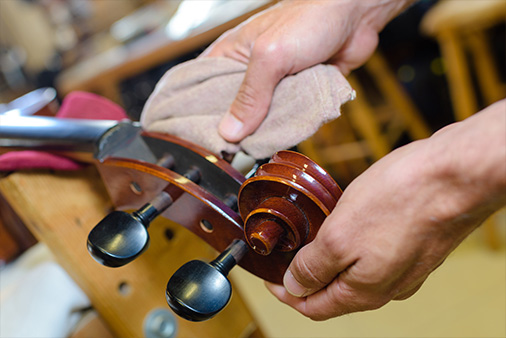How Should You Care For Your Musical Instrument?
Aug 02, 2023

Ah, summer, the season of slack. There’s less stuff we have to do in the summer, and more time for things we want to do. Summer is also a time to get things squared away: weed the garden, wash the car, clean the garage, organize the closet. So, while you’re in your summer square-away mode, don’t forget to take care of your musical instruments.
When is the last time your band or orchestra student had their instrument professionally cleaned, tuned, adjusted, lubricated and repaired? Chances are that instrument has been played a lot, cased and carried, and taken in and out of hot and cold environments over the past year. It’s time to bring your instruments to Meyer Music before the hustle and bustle of the start of the new school year. Without daily band practice, a student has time to let go of his instrument for a few days while we fix it up. Our technicians are ready to help you with any instrument you bring to one of our three locations.
What is the General Maintenance of Musical Instruments?
Instruments that are not well-maintained become more difficult to play over time. String instruments, including violins, cellos and guitars, need to be set to the proper action (the distance between the fingerboard and the strings). When the action is set too high, the instrument will be much more difficult to play. A musician who plays his or her instrument every day won’t notice the gradual, degrading change, but over time, the musician has to compensate for a poorly prepared instrument. This compensation can even lead to bad playing habits.
How Often do You Need to Clean Your Instrument?
Instruments collect dirt, dust, moisture, saliva, and whatever’s in the air we breathe. This is especially true for school band instruments that are played outdoors. It’s important to keep instruments clean and lubricated, and sometimes instruments get a buildup of oil or grease. It’s important for musicians to clean their instruments each time they are played. A professional cleaning can fix a lot of problems and give the musician a fresh start, and it’s recommended to do this annually. Also, always wash and dry your hands before playing your instrument. This will lessen the amount of dirty buildup on your instrument’s surface.
What Not to do With Your Musical Instrument?
You should avoid extreme temperatures. Heat and humidity cause wood instruments to warp or crack, and extreme dryness can cause strings to break or get out of tune. Heat loosens an instrument’s necessary level of tension. Cold temperatures cause instruments to contract and stiffen. An instrument should be kept at a constant room temperature year-round. While this is more easily said than done, especially in a climate like we have here in the American Midwest, where we swing from extremely cold winters to scorching summers, the best advice is to keep your instrument in a case that is dry and protects it from extreme temperatures. Don’t leave your instrument in a garage, storage facility or any place that is not climate-controlled, and don’t leave it at home when you’re on summer vacation if you plan to turn your thermostat above 78 degrees.
Another thing to avoid is leaving an instrument in a place where it can get knocked over, stepped on, or have accidental contact with people, pets and all their stuff. Put your instrument in a properly fitted case with ample padding and no moisture. Don’t pile sheet music, straps, picks, mouthpieces or other accessories on top of the instrument before you close the case, as these materials can press against the instrument and damage it during storage. Be sure the clamps, latches and handles of the instrument’s case are in good condition. Don’t use tape, rubber bands or other household materials to secure your case. Get your case repaired or replace it.
What is the Resale Value of an Instrument?
Just as a well-maintained car or truck has a greater resale price than one that has been neglected, so, too, will a well-cared-for musical instrument have a better resale or trade-in value. Eventually almost every musical instrument is sold, either because the musician wants to upgrade or, occasionally, the musician loses interest in that particular instrument.
Where can you get your instruments repaired in Kansas City?
Bring your instruments to one of Meyer Music’s three locations in Kansas City or contact us online.

